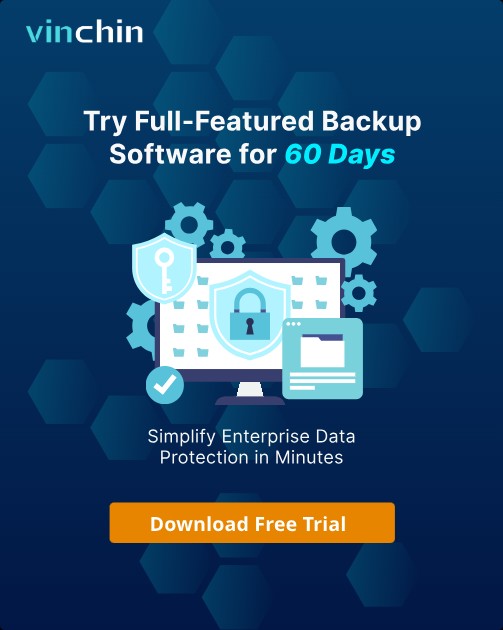-
E‑commerce Data Characteristics
-
E‑commerce Backup Challenges
-
Common Backup Methods in E‑commerce
-
Vinchin’s Data Protection Solution for E‑commerce
-
E‑commerce Data Backup FAQs
-
Conclusion
In today’s digital marketplace, e-commerce businesses handle a flood of transactions, customer data, and product information every second. With this rapid growth comes a new set of risks—data loss, cyberattacks, and compliance failures can all threaten your reputation and bottom line. That’s why having a reliable e‑commerce data backup solution is not just a best practice, but a necessity. In this article, we’ll explore the unique data challenges of e-commerce, common backup methods, and how to choose the right solution to keep your business running smoothly.
E‑commerce Data Characteristics
E-commerce companies generate and store vast amounts of data every day. This includes order histories, payment records, customer profiles, product catalogs, and inventory levels. The scale of this data is growing fast, driven by more online shoppers and expanding product lines.
The systems behind this data are diverse. Online storefronts process orders and manage customer accounts. Payment gateways handle sensitive financial transactions. Inventory management systems track stock in real time. Each of these applications produces data in different formats—some structured, like databases, and some unstructured, like images or logs.
What makes e-commerce data unique? First, it is highly sensitive. Personal details and payment information must be protected at all times. Second, strict retention policies often apply. Regulations or business needs may require you to keep records for years. Finally, the data is always changing, with new transactions and updates happening around the clock. This dynamic environment demands a backup solution that is both flexible and robust.
E‑commerce Backup Challenges
Backing up e-commerce data is not as simple as copying files at the end of the day. Businesses face several major hurdles:
Downtime Risk: Even a short outage can mean lost sales and frustrated customers. An effective e‑commerce data backup solution must minimize downtime during both backup and recovery.
High Transaction Volume: Online stores process thousands of transactions per hour. Backups must keep up without slowing down the business.
Data Consistency: It’s critical that backups capture a consistent snapshot of all systems. Incomplete or out-of-sync data can lead to errors in orders, payments, or inventory.
PCI DSS Compliance: Handling payment data means following strict security standards. Your backup solution must support these requirements.
Regulatory Compliance: If you serve customers in the EU, you must protect personal data and honor requests for deletion or access. Backups must be secure and compliant.
Ransomware Threats: Cybercriminals target e-commerce sites for their valuable data. Backups must be protected from tampering or encryption.
Scalability: As your business grows, your backup system must scale to handle more data and new applications.
These challenges make it clear: a generic backup tool is not enough. E-commerce businesses need a solution built for their unique environment.
Common Backup Methods in E‑commerce
E-commerce companies use several backup strategies to protect their data. Each method has its strengths:
Full Backup: This method copies all data at once, creating a complete snapshot. It’s simple and reliable, but can be slow and require lots of storage.
Incremental Backups: Only data that has changed since the last backup is saved. This approach is fast and efficient, reducing storage needs and network load.
Differential Backups: These backups capture all changes since the last full backup. They strike a balance between speed and completeness.
Cloud-Based Backups: Data is sent to secure cloud storage, protecting it from local disasters. Cloud backups offer flexibility, offsite protection, and easy scaling.
Hybrid Solutions: Combining local and cloud backups gives you the best of both worlds—fast recovery from local copies and disaster protection from the cloud.
Choosing the right mix depends on your business size, transaction volume, and compliance needs. Many e-commerce firms use a combination to ensure both speed and safety.
Vinchin’s Data Protection Solution for E‑commerce
Vinchin has already delivered data protection solutions to numerous enterprises in the e-commerce industry.
Vinchin supports over 19 virtualization environments—including VMware®, Hyper-V®, Proxmox®, plus physical servers—and protects databases as well as on-premises or cloud file storage systems; this broad compatibility meets diverse IT architecture needs found across online retail businesses.
If migration is required—whether between virtual machines (VMs), physical servers (PMs), or clouds—Vinchin Backup & Recovery offers flexible full-system migration, making workload transfers quick across any supported platform.
For critical workloads on VMs or PMs where uptime matters most—real-time backup with replication delivers extra recovery points while automated failover helps reduce RPO/RTO significantly. To guarantee reliability when restoring operations after an incident—Vinchin performs automatic integrity checks on backups; recoverability validation runs safely in isolation so you know restoration will work when needed.
You can build resilient disaster-recovery systems using Data Retention; archive/Cloud-based backups; create remote replicas or DR centers—all ensuring rapid recovery if disaster strikes. With its simple B/S web console plus wizard-driven workflows—even non-experts can quickly set up jobs for protection without hassle.
A 60-day free trial lets you test Vinchin risk-free; comprehensive documentation plus patient support engineers help deploy easily so your team protects vital e-commerce assets efficiently from day one.
E‑commerce Data Backup FAQs
Q1: How often should I back up my e-commerce data?
Daily or real-time backups are recommended to minimize data loss and ensure business continuity.
Q2: Can I restore only specific orders or customer records from a backup?
Yes, most advanced solutions allow granular recovery of individual records or files.
Q3: What happens if my main server is hit by ransomware?
A secure backup lets you restore clean data and resume operations without paying a ransom.
Conclusion
E-commerce businesses face unique risks and data demands, making robust backup essential for survival and growth. The right e‑commerce data backup solution protects your transactions, customer trust, and compliance standing. Vinchin stands out as an advanced provider for e-commerce data protection needs.
Share on:







